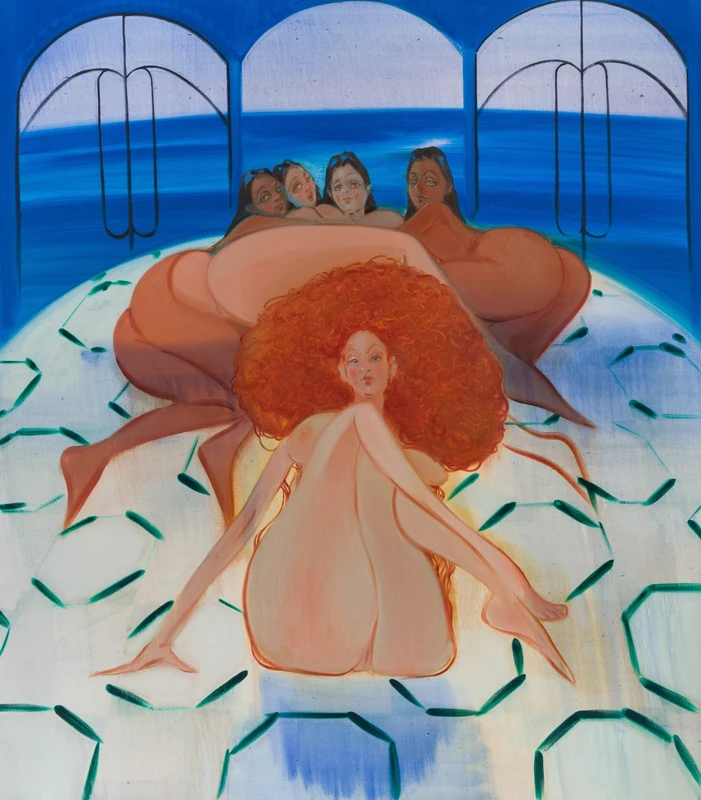Sofia Mitsola Villa Venus: The Garden
5 Jun-20 Jul 2024
PV 4 Jun 2024, 6-8pm


Pilar Corrias presents Villa Venus: The Garden, an exhibition of new paintings, sculpture and animation by Sofia Mitsola – the latest chapter in the artist’s ongoing series depicting a utopian, Cycladic island ruled by her female characters.
Using a saturated palette, Mitsola layers washes of vivid, unadulterated colour with large, immediate brushstrokes and thick impasto. In various states of repose, her protagonists inhabit palatial spaces with self-possession and ease, in turn demanding that the viewer reckon with the direction of their own gaze. Do these figures pose for our gratification or their own? Are their brazen stares invitations or predatory?
The exhibition takes ‘Villa Venus’, the chain of brothels described in Vladimir Nabokov’s novel, Ada or Ardor (1969), as its point of departure to explore the staging of fantasy and eroticism, and broader questions of autonomy, freedom, artifice and fetishism. In Nabokov’s novel, an architect builds a chain of decadent, temple-inspired brothels across the world, realising the fantasies drafted in his late grandson’s erotic journals. The architect’s ‘parodies of paradise’ soon crumble into nefarious dens of squalor and, like the garden mazes through which patrons would access Villa Venus, this staging of another’s Eden becomes a wasteland of weeds.
In her paintings, Mitsola also acts as an architect of fantasy, constructing opulent temples reminiscent of seraglios, bath houses or boudoirs for her siren-like figures. Employing the spatial logic of set design from the 1960s, Mitsola’s environments share the flatness of the stage, where a whole world can be built upon the surface of things. Up close, the onlooker, becoming aware of the performance, must accept their complicity in the suspension of disbelief, upon which all modes of fantasy rely. In the small room at the back of the gallery, Mitsola extends this element of set-building, constructing a draped, temple-like setting to house a new animation. Softened by hanging chiffon, the painted columns and caryatids from her paintings extend into this space, inviting the viewer into the imagined architecture.
A rose is present in several works on display; most evidently in Mitsola’s sculpture, her nod to a scene in Ada, where the young narrator visits a shop specialising in the reproduction of antiques and objets d’art. The narrator is perturbed by the unexpected sensation of a real flower hiding among a bunch of imitation crimson roses. In this emporium of artifice and counterfeit, the outlier is the genuine object. In Mitsola’s paintings, the viewer is led through a similar hall of mirages and double images. Interrogating the concept of utopia and its inherent contradictions, the artist builds a seductive world that situates scenes of her protagonist’s liberation within constrictive frameworks.